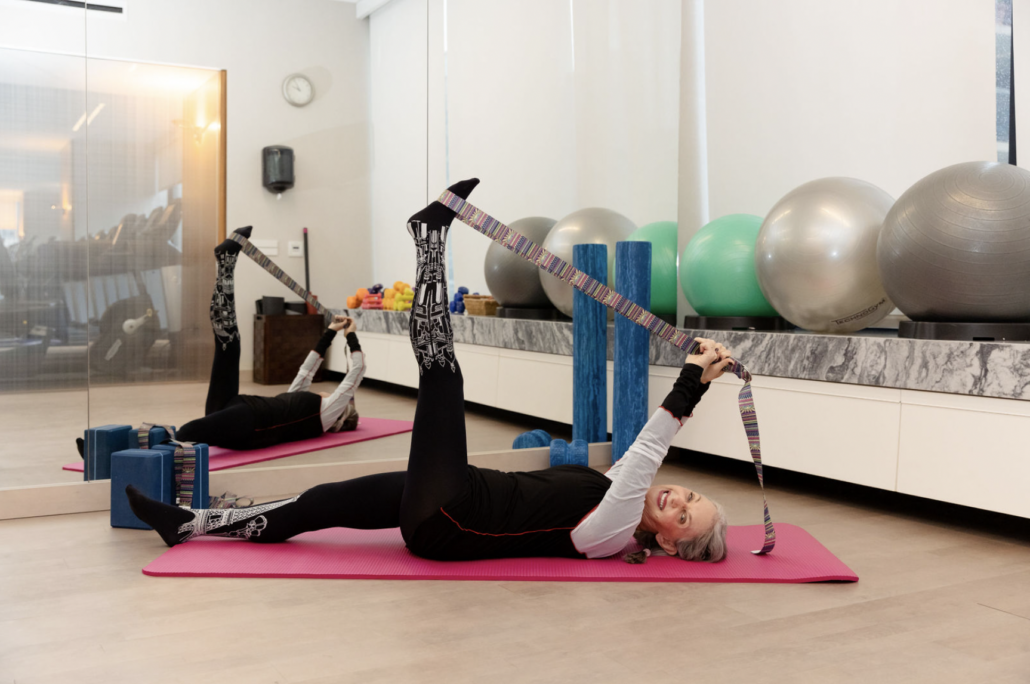 WOMEN OVER 50: LET’S GET BETTER SLEEP
WOMEN OVER 50: LET’S GET BETTER SLEEP
So, you’re spending adequate time in bed, but you typically wake up tired and unrested. Frustrating as it is, you can’t seem to shut your brain off long enough to get a good night’s sleep, which can be attributed to various sleep problems affecting your sleep quality.
Introducing healthy sleep habits can be a solution to address these sleep problems and enhance your overall sleep quality.
You’re way past your college days where you could sleep for 5 hours and have that last you two days. You’ve tried everything – sleeping pills, no caffeine, counting sheep, but nothing’s working. Fortunately, there exists a bunch other things you can do (or not do) to help you not only fall asleep quicker, but improve the quality of your sleep as well.
QUICK FACTS ABOUT BETTER SLEEP AND HEALTH FOR WOMEN OVER 50
- Sleep Needs: According to the National Sleep Foundation, adults aged 26-64 need 7-9 hours of sleep per night, and adults 65+ should aim for 7-8 hours. However, sleep quality tends to decrease with age due to changing sleep architecture, including lighter sleep stages and shorter periods of deep sleep. It’s important to understand how much sleep different age groups need to maintain optimal health.
- Health Risks of Poor Sleep: Chronic sleep deprivation is linked to an increased risk of health conditions, including obesity, diabetes, heart disease, and dementia. Getting enough sleep is crucial for overall health and well-being.
- Exercise Timing: Physical activity improves sleep, but try to finish workouts at least 2-3 hours before bedtime.
- Insomnia Prevalence: Women are 40% more likely than men to experience insomnia, with menopause and post-menopause significantly increasing these rates.
- Hormonal Impact: About 61% of post-menopausal women experience sleep disruptions like night sweats, affecting overall sleep quality.
BETTER SLEEP IS SELF CARE
When talking about wellness for women over 50, healthy sleep is one of the most powerful forms of self-care, especially when life feels heavy. For women dealing with the deep emotions of adult child estrangement or widowhood, sleep can often be hard to come by as thoughts and feelings linger into the night. But prioritizing restful sleep is essential; it helps us process emotions, boosts mental strength, and gives us the energy to face each day. Creating a calming sleep routine can offer a moment of peace each night, helping women on these journeys nurture their minds and bodies in a truly restorative way.
Nighttime sleep is crucial for overall health, and factors such as consistent sleep patterns, daytime habits like napping and caffeine consumption, and environmental factors like light exposure and bedding quality can significantly enhance or disrupt it.
Here are 9 tips to get better sleep.
9 BETTER SLEEP TIPS FOR WOMEN OVER 50

1. Meditation
Learning to invite breath into different parts of your body can help to focus your energy. By breathing into your belly, you engage your parasympathetic nervous system, which is the opposite of the “fight or flight” response.
In the state, your heart rate slows and the body is more likely to transition to sleep faster than it normally would. This deep breathing can be practiced throughout the day as well, in order to develop an automatic physical response. Progressive muscle relaxation is another technique that can help ease into sleep by systematically tensing and relaxing different muscle groups. Meditation is personal and it can be used in conjunction with other tips on this list such as aromatherapy, listening to music, and mindfulness meditation to promote relaxation and sleep.
If you need help getting started with meditation, check out this amazing book.
2. Yoga
Doing yoga or Pilates during the day or creating a yoga routine before bedtime is a great way to slow the body down physically. Hip opening stretches allow any excess tension and stress to be released, while forward bends create a sense of soothing introversion.
More stimulating yoga practice during earlier hours of the day allows excess tension to be released through a healthy outlet. Through mindfulness movements, the mind and body are able to connect, which allows sleep to come easier later on.

3. Aromatherapy
Using aromatherapy at night can greatly improve your chances of sleep. Essential oils such as jasmine, lavender, and chamomile help the body to relax and induce sleep.
Lavender especially has been studied extensively as a natural sedative. One study, in particular, had a focus group of insomniac women in midlife.
Still, you may try different oils to see which scents resonate with your body but lavender and chamomile are great starters that work for most people. Putting essential oils on your wrists, neck, and even pillowcase can help to soothe you to peaceful sleep rather than letting thoughts in your brain race all night long.
4. Stay Cool!
It’s scientifically proven that you sleep better when you are cool. And any woman over 50 who has experienced night sweats would agree! That means having a cool room (around 65 degrees is best) and having a cool bed.
Try a gel mattress topper to help cool you down. Another great, and beautiful way? Have the right bedding for the right season. Tencel sheets are temperature regulating, among their other benefits. These are my favorites!
5. Massage
You might try rubbing your temples, neck, shoulders, upper back, and arms before bedtime to show muscles some love.
Tactile massage helps to release physical tension, which can cause discomfort that detracts from sleep. If you are unable to get comfortable in a resting position, you’re likely to remain awake for a longer period of time. Self-massage and partner massage are both great ways to ease muscles. There are many massage devices on the market now that can ensure your neck and shoulders are relaxed and ready to rest. Try this Shiatsu massager.
6. Music and White Noise
Soothing music or nature sounds are a common sleep aid for lots of individuals who find themselves unable to relax. Try listening to your music and concentrating on deep breathing to transition into dreamland rather than counting sheep. To me, French music or Hawaiian music are instantly calming. If you live somewhere that outside noises are disruptive, you should order a white noise machine!

7. Create a Routine
Creating a bedtime routine is one of the underappreciated and underutilized ways to consistently and reliably induce sleep. Maintaining a consistent sleep schedule is crucial for achieving better sleep quality.
Whether it’s taking a warm bath, brushing your teeth, reading a book, or drinking a glass of milk before bed; consistently doing the same routine before going to sleep can let your body know when it’s time to wind down and will make sleep easier in the future. Going to bed at the same time every night can help regulate your body’s internal clock and improve overall sleep quality.
Three to four weeks of consistency is a good starting point as it’s generally believed that this is the period it takes to develop habits that stick.
8. Honor Your Bedtime
Particularly if you’re still working, it’s important to go to bed on time so you get at least 7 hours of sleep. Establishing a consistent wake-up time as part of a healthy sleep routine is equally important. If you consistently go to sleep late, say by one hour every night, you basically rob yourself of a full night’s sleep every week!
9. Exercise
Exercise can help you to improve the quality of your sleep, but WHEN you choose to exercise is very important. Contrary to what you may believe, exercising before bed won’t tire you out.
The release of certain hormones can give you a false sense of feeling active and refreshed. This is why it’s recommended that any major exercise be done a few hours before your regular or intended bedtime.
10. Nap Early or Don’t Nap At All
Daytime naps can influence nighttime sleep quality, as late naps decrease sleep drive and make it much harder to fall asleep when it’s bedtime. Take a nap, but make sure it is early in the day!
11. Optimize Your Bedroom Environment
Creating a sleep-friendly bedroom environment is essential for improving sleep quality. A well-optimized bedroom can help you fall asleep faster and stay asleep longer. Here are some tips to transform your bedroom into a sleep sanctuary:
- Keep it Cool: Aim for a room temperature around 65 degrees Fahrenheit. A cooler room can help you fall asleep faster and enjoy a deeper, more restful sleep.
- Darkness is Key: Invest in blackout curtains or shades to block out any light that may disrupt your sleep. Darkness helps regulate your body’s internal clock, signaling that it’s time to wind down.
- Minimize Noise: Use earplugs or a white noise machine to drown out any disruptive sounds. Consistent, soothing sounds can create a calming atmosphere conducive to sleep.
- Improve Air Quality: Consider using a humidifier or air purifier to enhance the air quality in your bedroom. Fresh, clean air can make a significant difference in how well you sleep.
- Ventilation Matters: Ensure your bedroom is well-ventilated to prevent the buildup of carbon dioxide, which can affect sleep quality.
- Limit Electronic Devices: Keep TVs, computers, and smartphones out of the bedroom. The blue light emitted by these devices can interfere with your body’s natural sleep-wake cycle.
By optimizing your bedroom environment, you can create a peaceful retreat that promotes better sleep and enhances the quality of your rest.
12. Avoid Stimulating Foods and Drinks Before Bedtime
What you consume before bedtime can significantly impact your ability to fall asleep and the quality of your sleep. Certain foods and drinks can be stimulating, making it harder to wind down. Here’s what to avoid and what to opt for instead:
- Caffeine: Steer clear of caffeine at least 4-6 hours before bedtime. This stimulant can keep you awake and disrupt your sleep cycle.
- Nicotine: Like caffeine, nicotine is a stimulant that can interfere with your ability to fall asleep and stay asleep.
- Alcohol: While a nightcap might make you feel drowsy, alcohol can disrupt your sleep patterns and reduce the overall quality of your sleep.
- Heavy Meals: Avoid eating large, heavy meals close to bedtime. They can cause discomfort and indigestion, making it difficult to fall asleep.
- Sugary Foods: Consuming sugary foods before bed can lead to spikes and crashes in blood sugar levels, resulting in restless sleep.
Instead, opt for relaxing alternatives like herbal teas, warm milk, or a light snack. These can help you unwind and prepare your body for a restful night’s sleep. By avoiding stimulating foods and drinks, you can promote better sleep and improve the quality of your rest.
UNDERSTANDING AND ADDRESSING COMMON SLEEP DISORDERS
Sleep disorders can significantly impact your sleep quality and overall well-being. Understanding these disorders and how to address them is crucial for achieving better sleep. Here are some common sleep disorders and ways to manage them:
- Insomnia: Characterized by difficulty falling asleep or staying asleep, insomnia is a common issue. Addressing insomnia often involves lifestyle changes, relaxation techniques, and cognitive behavioral therapy to help reset your sleep patterns.
- Sleep Apnea: This disorder causes brief interruptions in breathing during sleep. Managing sleep apnea typically requires lifestyle changes, weight loss, and the use of a continuous positive airway pressure (CPAP) machine to keep airways open.
- Restless Leg Syndrome (RLS): RLS involves an uncontrollable urge to move your legs, often disrupting sleep. Treatment may include lifestyle changes, relaxation techniques, and medication to alleviate symptoms.
- Narcolepsy: This condition affects the brain’s ability to regulate sleep-wake cycles, leading to excessive daytime sleepiness. Managing narcolepsy often involves medication, lifestyle adjustments, and behavioral therapy.
By understanding and addressing these common sleep disorders, you can improve your sleep quality and overall health. If you suspect you have a sleep disorder, consult a healthcare professional for a proper diagnosis and treatment plan.
KNOWING WHEN TO SEEK HELP FOR SLEEP ISSUES
Recognizing when to seek professional help for sleep issues is crucial for maintaining your overall health and well-being. Here are some signs that it might be time to consult a healthcare professional:
- Difficulty Falling Asleep or Staying Asleep: If you consistently struggle with falling asleep or staying asleep, it may indicate an underlying sleep disorder.
- Waking Up Tired: Feeling groggy or unrefreshed upon waking, despite spending adequate time in bed, can be a sign of poor sleep quality.
- Daytime Fatigue: Difficulty concentrating, memory problems, or feeling excessively tired during the day can all be linked to insufficient sleep.
- Mood Changes: Irritability, mood swings, or increased anxiety can be exacerbated by poor sleep.
- Increased Risk of Accidents: Sleep deprivation can lead to a higher risk of accidents or injuries, both at home and in the workplace.
If you experience any of these symptoms, it’s essential to seek help from a healthcare professional. They can diagnose any underlying sleep disorders and provide treatment options to improve your sleep quality. Remember, prioritizing sleep is vital for your overall health and well-being. By seeking help when needed, you can ensure you get the restorative sleep your body needs.
BETTER SLEEP PRODUCTS FOR WOMEN OVER 50
HOW TO SLEEP BETTER OVER 50
These natural, time-tested tips are easy to try and can make a real difference in your sleep quality and overall well-being. Women over 50 have unique sleep needs, and by integrating practices like yoga and meditation, you can deepen the connection between mind and body. Aromatherapy, massage, and calming music can further soothe your senses, creating a holistic approach to better sleep.
Think of your pre-sleep routine as an essential part of self-care—because quality sleep is the best form of medicine. Experiment with these strategies to build a bedtime ritual that’s as unique as you are. By tuning in to what works best for your body and mind, you’ll be setting yourself up for more restful nights and brighter days. Embrace these habits, and let sleep become a time of true relaxation, renewal, and healing.
What do you do to help yourself sleep better? Let us know in the comments at the bottom of this page!

Come follow me on Instagram!
This article was written by Trysh Sutton & updated by Honey Good. Trysh is a wife, mother, strategic leader, and teacher. She runs a website called Pure Path, which is a naturopathic wellness site that promotes healthy living and healing through the use of essential oils and sustainable living. You can follow her on social media to learn more about the benefits of essential oils and healthy living practices.

These sleeping tips are very useful and thank you for sharing.
It is my pleasure sharing. Happy New Year. Warmly, Honey
I go to sleep listening to an audio book on my phone. I don’t like earplugs or big headsets but use the ones that are around the back of the neck and over my ears and are Bluetooth.
Only problem is I have to figure out where In the story I fell asleep so I can backtrack to listen again, not only in bed but while cooking, cleaning, etc..
I think it’s a holdover from childhood when my mother would put her children to bed for naps or bedtime and would read to us.
My mother read to us, also. When I listen to books on tape I fall asleep. The cadence of a voice, no matter whose, lulls me into sleep. I cannot listen to books on tape when I am driving.You do have a problem, finding your way back to where you left off. There must be a solution? Warmly, Honey